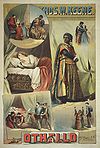- Giovanni Battista Giraldi
-
Giovanni Battista Giraldi (November 1504 – 30 December 1573) was an Italian novelist and poet. He appended the nickname Cinthio to his name and is commonly referred to by that name (which is also rendered as Cynthius, Cintio or, in Italian, Cinzio).
Born at Ferrara, he was educated at the university there, and in 1525 became its professor of natural philosophy. Twelve years afterwards, he succeeded Celio Calcagnini in the chair of belles-lettres.
Between 1542 and 1560 he was a private secretary, first to Ercole II and afterwards to Alfonso II d'Este; but having, in connection with a literary quarrel, lost the favour of his patron, he moved to Mondovi, where he remained as a teacher of literature until 1568. Subsequently, on the invitation of the senate of Milan, he occupied the chair of rhetoric at Pavia until 1573, when, in search of health, he returned to Ferrara, where he later died.
Besides an epic entitled Ercole (1557), in twenty-six cantos, Cinthio wrote nine tragedies, the best known of which, Orbecche, was produced in 1541. The bloodthirsty nature of the play, and its style, are, in the opinion of many of its critics, almost redeemed by occasional bursts of genuine and impassioned poetry.
His literary work was ideologically influenced by the Catholic Reformation. In the theatrical works there appears a vein of experimentation that anticipates some typical elements of taste of the modern European theatre, for example the Elizabethan theatre and baroque styles, where psychological violence and horror are used in function and dramatic action structured in real time.
Among the prose works of Cinthio is the Hecatommithi or Ecatomiti, a collection of tales told somewhat after the manner of Boccaccio, but still more closely resembling the novels of Cinthio's contemporary, Matteo Bandello. Something may be said in favour of their professed claim to represent a higher standard of morality. Originally published at Mondovì in 1565, they were frequently reprinted in Italy, while a French translation appeared in 1583 and one in Spanish in 1590. They have a peculiar interest to students of English literature, for providing the plots of Measure for Measure and Othello. That of the latter, which is to be found in the Hecatommithi is conjectured to have reached Shakespeare through the French translation; while that of the former is probably to be traced to George Whetstone's Promos and Cassandra (1578), an adaptation of Cinthio's story, and to his Heptamerone (1582), which contains a direct English translation. It has also been noted that the story of Othello and Un Capitano Moro resemble the earlier tale of The Tale of the Three Apples, a story from One Thousand and One Nights.[1] To Cinthio also must be attributed the plot of Beaumont and Fletcher's Custom of the Country.
Bibliography
Jossa, Stefano Rappresentazione e scrittura. La crisi delle forme poetiche rinascimentali (1540-1560), Naples: Vivarium, 1996. [ISBN: 8885239137]
See also
References
- ^ Young, John G., M.D., "Essay: What Is Creativity?", Adventures in Creativity: Multimedia Magazine 1 (2), http://www.adventuresincreativity.net/2mag1.html, retrieved 2008-10-17
 This article incorporates text from a publication now in the public domain: Chisholm, Hugh, ed (1911). Encyclopædia Britannica (11th ed.). Cambridge University Press.
This article incorporates text from a publication now in the public domain: Chisholm, Hugh, ed (1911). Encyclopædia Britannica (11th ed.). Cambridge University Press.
William Shakespeare's Othello Characters Source - "Un Capitano Moro" from Gli Hecatommithi (1565) by Giovanni Battista Giraldi
Opera and
ballet adaptationsScreen adaptations Stage adaptations - Catch My Soul (US) (1969)
- Catch My Soul (UK) (1970)
Categories:- 1504 births
- 1573 deaths
- People from Ferrara
- Italian writers
Wikimedia Foundation. 2010.

